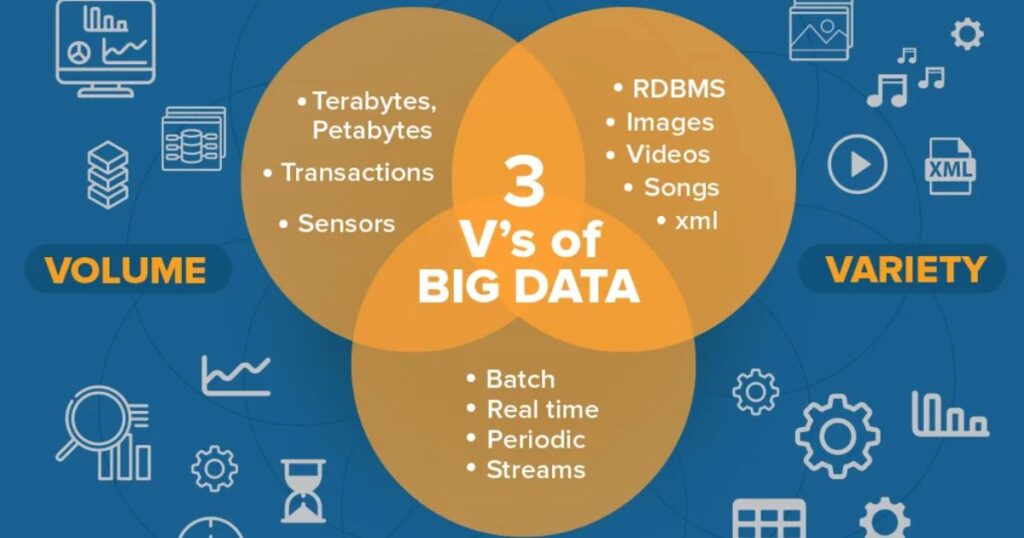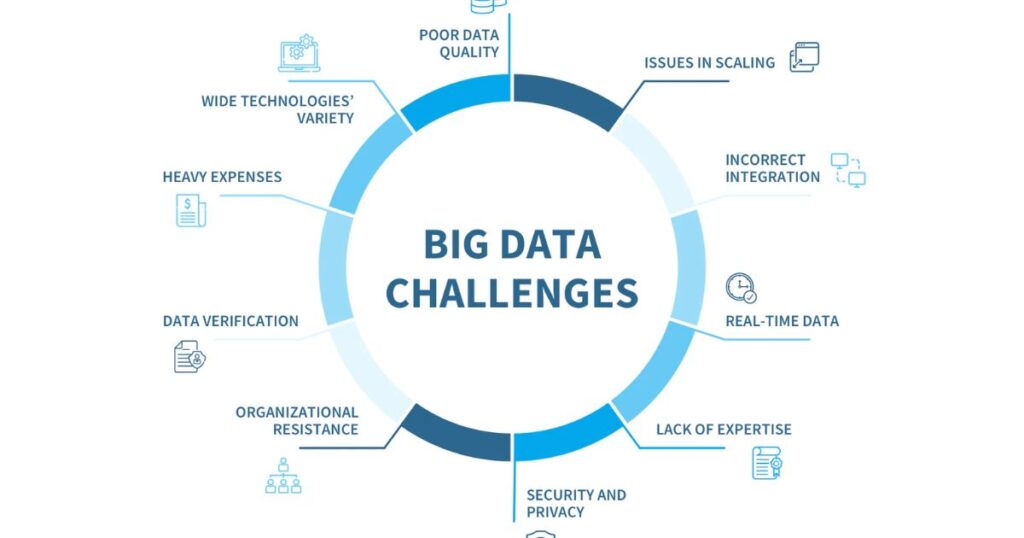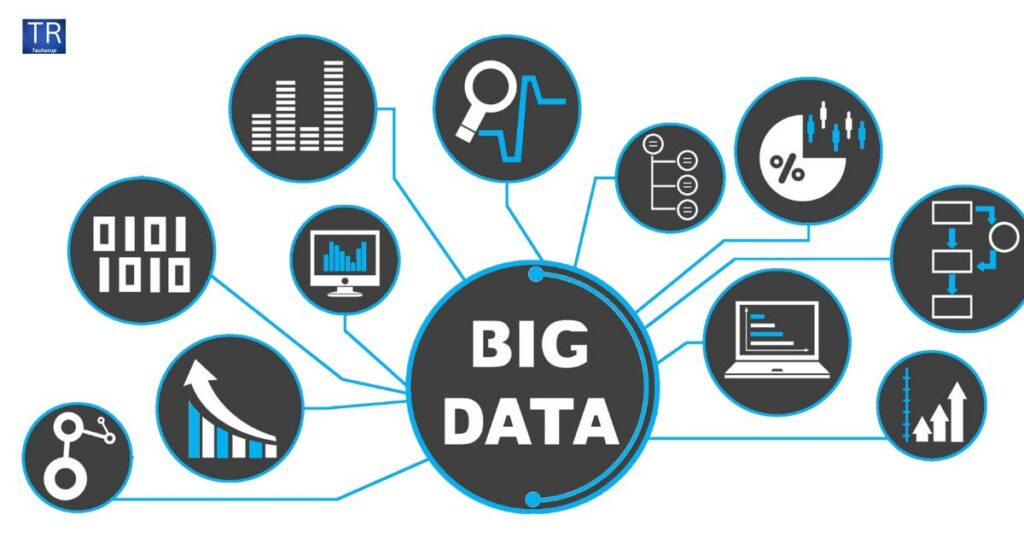Big Data refers to extraordinarily massive and various datasets that keep growing exponentially over the years.These datasets are so huge and complex in volume, pace and range that traditional statistics control systems can not deal with them effectively.As virtual technology improves, companies must undertake revolutionary tools and strategies to harness massive records’s potential for progressed decision making and enterprise boom.
What is Big Data?
It refers to massive and various collections of records that develop swiftly through the years. It includes structured, unstructured and semi based facts from numerous assets, making it complex to manipulate.
This data is characterized by its high volume, velocity and variety.Traditional data systems struggle to handle big data effectively.As technology advances, businesses must adopt new tools to collect and analyze this information for better decision making.
Read Also: Artificial Intelligence
Big Data Tool
Large facts equipment are critical for dealing with and reading large datasets.Those equipment help organizations acquire, manner, and visualize statistics efficiently.Famous big facts tools include Apache Hadoop.Which stores and processes massive quantities of statistics and Apache Spark, recognised for its fast statistics processing skills.
Different equipment like Tableau and electricity BI are used for facts visualization, making it simpler to understand complex records.The use of the right large statistics gear can considerably decorate enterprise operations.
They permit businesses to benefit insights from their records quickly and correctly.By way of leveraging the ones tools, organizations can enhance choice making, boom performance and pressure innovation.As technology keeps adapting, new big statistics gear will emerge, helping agencies live competitively in a statistics world.
Big data examples
It is transforming how businesses function throughout numerous industries.As an instance, retailers’ music clients conduct to provide personalized product suggestions.In finance, organizations monitor fee styles to come across fraud in real time.
Moreover, logistics firms combine information from shipment trips with site visitors insights to optimize deliveries.Healthcare corporations use AI to analyze unstructured clinical records, improving affected person care.These examples display how big data helps businesses make knowledgeable decisions and decorate their services.
Read Also: Exploring The Potential Of www.goodmooddotcom.com
The Vs of big data
The Vs of big data are important characteristics that outline its nature.The primary V is extent, which refers to the considerable quantity of records generated from numerous resources.The second V is speed, indicating the velocity at which these facts are produced and must be processed.

Ultimately, variety describes the unique styles of information, inclusive of established, unstructured and semi structured codecs.In addition to these three Vs, there are three extra: veracity, which addresses the first class and accuracy of the information; variability, highlighting how the.
Which means statistics can alternate over time and cost, emphasizing the significance of extracting beneficial insights from the information accrued.Information these Vs facilitate businesses successfully control and leverage large data for better choice making and increase.
How does big data work?
Data Collection: big data gathers huge volumes of raw facts from diverse resources, along with social media, sensors and transactions.
Data Processing: The collected statistics is processed and converted right into a usable layout for evaluation.
Data Storage:statistics storage: organizations save huge facts in cloud based structures or on premises solutions, ensuring it’s far handy and comfortable.
Real Time Analysis: organizations examine information in actual time to benefit instantaneous insights and make knowledgeable choices.
Visualization: information visualization gear, which include charts and dashboards, help talk insights surely across the business enterprise.
Continuous Improvement: via frequently studying huge data, agencies can pick out traits and optimize their operations for higher overall performance.
Big data benefits
Improved decision making
Massive information enables businesses to make better decisions by way of uncovering insights from big datasets.Reading large facts facilitates finding out styles that tell more effective operational and strategic selections.Information pushes choice making ends in progressed enterprise consequences.
Increased agility and innovation
It lets in groups to conform fast to marketplace modifications.via processing and analyzing real time facts factors, groups can advantage a competitive edge.Those insights manual the development and launch of latest products, features and updates, accelerating innovation.
Better customer experiences
Combining established and unstructured records affords deeper purchaser insights.This expertise permits personalization and optimization of the customer.Large facts enable agencies to better recognize and meet evolving customer desires and expectations, riding pleasure and loyalty.
Continuous intelligence
Continuous intelligence refers to the real time evaluation of information as it streams into an employer.This technique lets in organizations to combine automated statistics processing with superior analytics.
By means of constantly accumulating and analyzing information, agencies can quickly perceive tendencies and insights that force decision making.This functionality allows companies to reply rapidly to changes within the market and seize new opportunities for increase.
More efficient operations
Big data enables organizations to operate greater effectively by streamlining tactics and lowering charges.Through studying operational facts, agencies can pinpoint inefficiencies and regions for development.
This ends in quicker choice making and optimized workflows.With large records analytics equipment, businesses can system data quickly, permitting them to make informed selections that enhance productivity and keep time.
Improved risk management
Big data enhances threat management with the aid of offering deeper insights into ability threats.Groups can analyze extensive quantities of facts to perceive risks and monitor them successfully.
This proactive approach lets companies broaden robust strategies for hazard mitigation.By leveraging huge statistics, organizations could make knowledgeable decisions that guard their assets and make certain compliance with guidelines.
Challenges of implementing big data analytics

Implementing massive records analytics comes with numerous demanding situations that agencies should navigate to release its complete potential. right here are the key demanding situations
lack of facts skills and capabilities
There is a sizable scarcity of professional experts, including fact scientists and analysts, who can efficiently manage and analyze big information.This talent gap makes it hard for corporations to comprehend the total fee of their statistics tasks.
Speed of Data Growth
The speedy growth in factories can crush current infrastructure.Without sturdy structures in place, companies may also warfare to system, shop and at ease their facts correctly.
Problems with Data Quality
The best of information at once influences selection making and analytics.Uncooked facts may be messy and tough to curate, leading to inaccurate insights if not nicely managed.
Compliance Violations
Big data often carries sensitive facts, making it crucial for companies to conform with facts privacy guidelines.Making sure compliance may be complex and calls for ongoing tracking of information processing practices.
Integration Complexity
Many corporations face challenges integrating statistics from various siloed structures.Making disparate records assets accessible for analysis is crucial for knowing the cost of huge facts, however it may be a complicated venture.
Security Concerns
Big statistics stores are attractive objectives for cyberattacks because of the treasured facts they incorporate.Protecting these records calls for comprehensive security strategies, which may be hard to implement given the complexity and type of the datasets.
Addressing those challenges is essential for corporations seeking to leverage huge facts analytics efficiently and gain a competitive aspect in their industries.
How are data driven businesses performing?
A few agencies continue to be cautious of going all in on big data due to the time, attempt and dedication it requires to leverage it successfully.Especially, corporations warfare to transform established approaches and facilitate the cultural alternative had to put records at the heart of every choice.
However turning into a records-driven business is really worth the paintings.Latest studies suggests:
- 58% of businesses that make records based choices are more likely to conquer sales goals than the ones that do not
- Businesses with superior insights pushed commercial enterprise talents are 2.8x much more likely to file double digit year over 12 months increase
- Statistics driven companies generate, on common, extra than 30% boom in step with year
The establishments that take steps now and make full size development towards enforcing large data stand to return as winners within the destiny.
Big data strategies and solutions
To effectively leverage large statistics, businesses need to undertake open, intelligent, bendy, and dependent techniques.An open architecture lets in for adaptability as facts, assets and technology evolve.

Investing in smart analytics and AI technology can streamline facts processing and beautify selection making.Automating processes and permitting self carrier analytics empowers groups to paint with records independently.
A flexible records basis presents on call for access to assets and unifies statistics for smooth discovery and access.Building trust in data is critical companies should make certain their information is correct, relevant and cozy to derive meaningful insights.
How to get started with big data for your business
Define Your Goals: Start with the aid of figuring out what you want to reap with big information.Set clear goals for your facts projects.
Determine Your facts sources: Evaluate the records you presently have and decide what
pick out the right gear: select massive information equipment and technologies that suit your enterprise needs.Recollect cloud answers for scalability and flexibility.
Construct an information group: bring together a team of professional professionals, together with data scientists and analysts, to manipulate and examine your statistics correctly.
Enforce information Governance: set up policies for data quality, security and compliance. make certain that your records are correct and guarded.
Begin Small: start with a pilot task to test your large statistics approach.Examine from this enjoy before scaling up.
Examine and Iterate: constantly examine your records and refine your techniques.Use insights to make knowledgeable choices and improve operations.
FAQ’s
What do you mean by big data?
It refers to extraordinarily large and numerous collections of based, unstructured and semi established facts that develop exponentially over time.
What are the 3 types of big data?
The 3 types of big data are established data, unstructured facts and semi structured information.
What is an example of big data?
It is monitoring patron conduct to provide personalized product recommendations in retail.
What is big data in AI?
It refers to the full size quantities of dependent and unstructured facts used to educate algorithms and enhance device getting to know fashions, enabling higher decision making and predictive analytics.
Final Thought
It refers to extremely massive and numerous collections of established, unstructured and semi established records that develop exponentially through the years.These datasets are so massive and complex in extent, speed and variety that conventional statistics management structures can not deal with them efficiently.
As digital technology enhances, corporations need to adopt innovative tools and strategies to harness huge factories’ capacity for stepped forward decision making and commercial enterprise growth.

Charlene J. Newton is an executed writer recognized for her captivating fiction and non-fiction works. With a keen eye for detail and an expertise for crafting attractive narratives, Newton’s writing has garnered crucial acclaim. Her diverse portfolio covers a variety of genres, from concept-provoking literary fiction to insightful non-public essays











